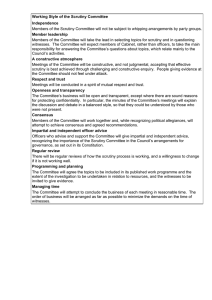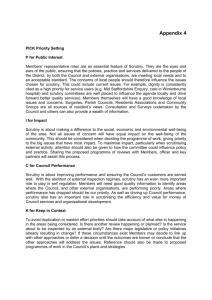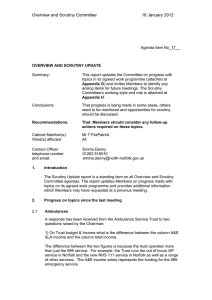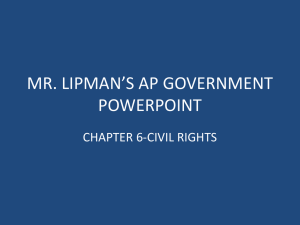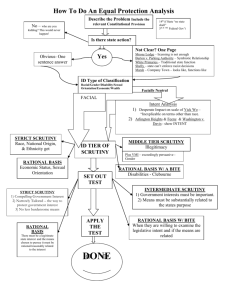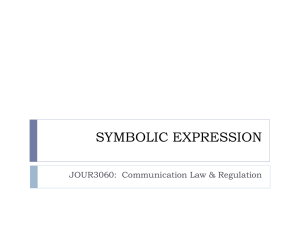THE SCRUTINY COMMITTEE WORK PROGRAMME TEMPLATE
advertisement
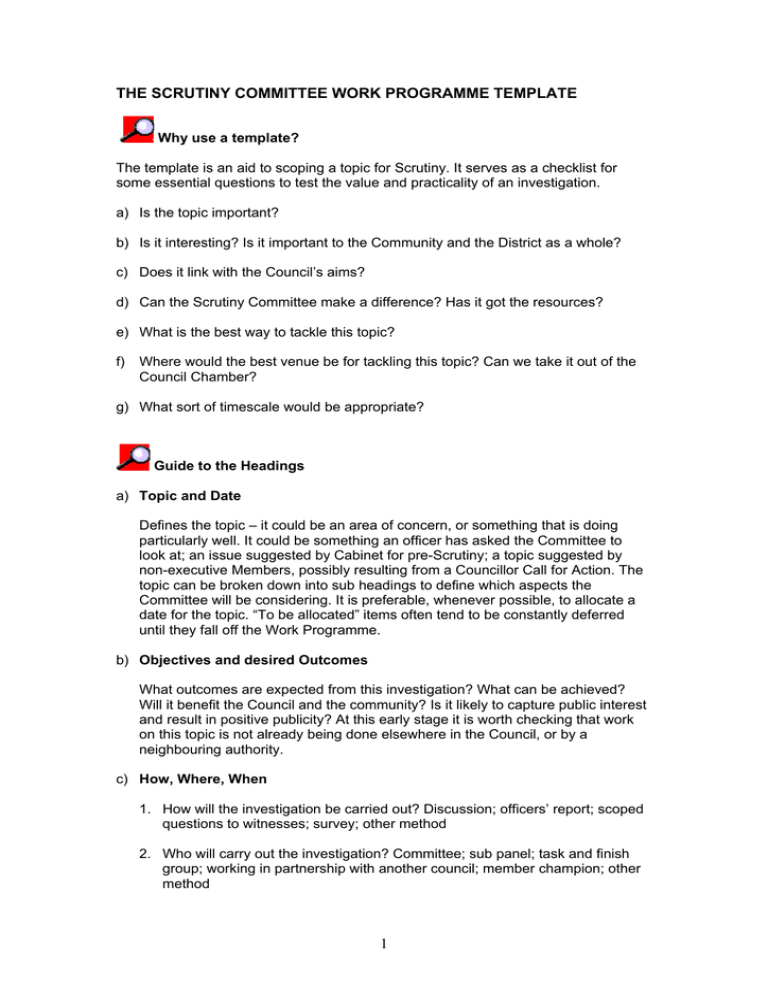
THE SCRUTINY COMMITTEE WORK PROGRAMME TEMPLATE Why use a template? The template is an aid to scoping a topic for Scrutiny. It serves as a checklist for some essential questions to test the value and practicality of an investigation. a) Is the topic important? b) Is it interesting? Is it important to the Community and the District as a whole? c) Does it link with the Council’s aims? d) Can the Scrutiny Committee make a difference? Has it got the resources? e) What is the best way to tackle this topic? f) Where would the best venue be for tackling this topic? Can we take it out of the Council Chamber? g) What sort of timescale would be appropriate? Guide to the Headings a) Topic and Date Defines the topic – it could be an area of concern, or something that is doing particularly well. It could be something an officer has asked the Committee to look at; an issue suggested by Cabinet for pre-Scrutiny; a topic suggested by non-executive Members, possibly resulting from a Councillor Call for Action. The topic can be broken down into sub headings to define which aspects the Committee will be considering. It is preferable, whenever possible, to allocate a date for the topic. “To be allocated” items often tend to be constantly deferred until they fall off the Work Programme. b) Objectives and desired Outcomes What outcomes are expected from this investigation? What can be achieved? Will it benefit the Council and the community? Is it likely to capture public interest and result in positive publicity? At this early stage it is worth checking that work on this topic is not already being done elsewhere in the Council, or by a neighbouring authority. c) How, Where, When 1. How will the investigation be carried out? Discussion; officers’ report; scoped questions to witnesses; survey; other method 2. Who will carry out the investigation? Committee; sub panel; task and finish group; working in partnership with another council; member champion; other method 1 3. Who will need to be involved? Officers; partners; local groups; members of the public? 4. Where will the investigation take place? Council Chamber; Committee Room; site visit; community venue; somewhere else, appropriate to the topic. 5. Will the method and venue chosen be accessible to everyone with an interest/involvement in this issue? 6. When is the best time to carry out this review? Is it linked to other work of the Council that is reported at specific intervals? Is it seasonal? Will witnesses be available for these dates? 7. What is the timescale for this review? It is important to have a clear timescale from the outset to prevent topics becoming permanent fixtures on the Work Programme and taking on a life of their own! Some topics are best suited to a one-off Task and Finish Group who report their findings and recommendations to the Committee. d) Resources required What resources will be needed to carry out this review effectively? NNDC Officers, including Service Heads, Scrutiny Officer and Democratic Services support? Specialists? Witnesses from other organisations? Do we have sufficient resources to carry out this review effectively? e) Organisation/Officer/Responsible Portfolio Holder Identifies those who have responsibility for the topic - this should always include the lead officer and the portfolio holder, who will both be invited to attend the relevant meeting. The organisation need not necessarily be NNDC – it could, for example, be the police or the local bus company. The Local Government and Involvement in Public Health Act 2007 gives Scrutiny Committees powers to scrutinise partner authorities who have a duty to “have regard” to a report or recommendations although they are not bound to implement them. f) Priority/urgency/strategic impact on District/community Members are asked to prioritise topics and to consider their relative urgency. Priority and urgency are not necessarily the same thing. It may, for example, be a high priority to scrutinise the provision of an ongoing service which is perceived to be performing poorly, but more urgent to investigate another service which is earmarked for withdrawal in the next month! Members should also consider the strategic impact on the District and community. There may, occasionally, be sound reasons for scrutinising a ward-based topic, for example a Councillor Call for Action. Wherever possible, however, the topic should consider the needs of the whole District and its residents. Even if the topic arises from a particular ward the investigation should aim to be district-based - for example a concern about dirty pavements in one of the market towns could become the basis for scrutiny of the street cleaning contract throughout North Norfolk. g) Interesting and of public concern Although this should not be the only consideration when scoping a topic, it is wellworth bearing in mind. The Council has a duty to promote public interest in 2 democracy and it should also be remembered that one of the 4 Principles of Good Scrutiny is “to reflect the voice and concerns of the public and its communities”. Topics such as Budget Monitoring and the Corporate Plan undoubtedly impact the residents of North Norfolk but do not capture their interest, or that of the Press. Good press coverage is invaluable in promoting the work of the Overview and Scrutiny Committee. A balanced Work Programme should aim to include topics of immediate public interest. h) Impact on Equality and Diversity Members should consider the equalities implications of any issue they are reviewing: Have equalities issues been taken into account when developing the policy/service? Is the service accessible to all? Will the views of disadvantaged people be heard during the review process? Will the review be held in a venue that is accessible to all? NB. It is compulsory to consider Equality and Diversity when scoping topics for Scrutiny. i) Links with the Corporate Plan and the Work of the Cabinet Scrutiny should work in close co-operation with the Cabinet. The Forward Plan is included with each Overview and Scrutiny Committee Agenda although, at time of writing, this only includes the key decisions. In deciding on topics for Scrutiny, Members should consider their relevance to the key aims of the Council, while recognising that there will be occasions when a topic does not directly dovetail with those aims but is nonetheless important. Mary Howard November 2011 3
